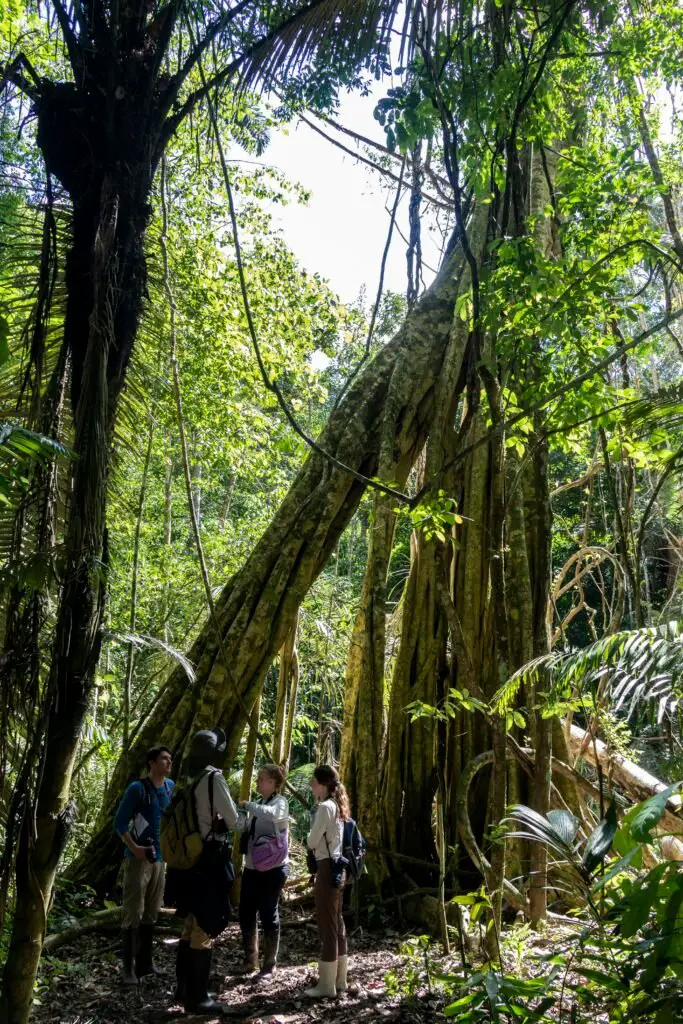
What is Eco-Tourism and Why It Matters
Eco-tourism, a subset of sustainable travel, focuses on responsible tourism practices that prioritize environmental conservation, community engagement, and cultural awareness. It is fundamentally guided by principles that advocate for minimizing the ecological footprint of travel and promoting the welfare of local communities. The essence of eco-tourism lies in its commitment to conserving natural resources while fostering educational experiences for travelers.
One of the primary goals of eco-tourism is to reduce the detrimental impacts that conventional tourism often has on ecosystems. Traditional tourism can lead to habitat destruction, pollution, and the depletion of natural resources. In contrast, eco-tourism emphasizes using these resources sustainably and responsibly, ensuring that travel experiences contribute positively to the environments visited. This commitment to conservation is not merely about protecting landscapes but also involves preserving biodiversity and safeguarding the delicate balance of local ecosystems.
Community engagement stands as another cornerstone of eco-tourism. By actively involving local populations in tourism initiatives, eco-tourism creates economic opportunities for residents, thereby fostering a sense of ownership over their cultural and natural heritage. This approach not only empowers communities but also enhances the travel experience by providing visitors with authentic cultural interactions and insights into local customs and traditions. Such engagement can help bridge the gap between tourists and hosts, promoting mutual respect and understanding.
Lastly, eco-tourism contributes significantly to raising awareness about environmental issues. Travelers participating in eco-tourism programs are often educated about conservation efforts and the importance of protecting natural resources. This education can inspire individuals to adopt more sustainable practices in their own lives, making ethical travel choices that benefit both local communities and the planet as a whole.
Top 5 Eco-Lodges That Are Saving the Planet
As eco-tourism continues to rise in popularity, numerous eco-lodges across the globe have emerged, dedicated to sustainable practices and responsible travel. These lodges not only offer unique experiences but also strive to minimize their environmental impact. Here are five exceptional eco-lodges that exemplify eco-friendly travel while supporting local communities.
The Inkaterra Machu Picchu Pueblo in Peru is a prime example of eco-lodging in a biodiverse area. Set against the backdrop of the Andes, this lodge emphasizes sustainable agriculture and employs renewable energy sources. Guests can enjoy guided nature walks, where they learn about the rich fauna and flora of the region while contributing to conservation efforts.
Next, the Post Ranch Inn in Big Sur, California, offers stunning views of the Pacific coastline. This eco-lodge integrates sustainable architecture and has made significant strides in waste management and water conservation. Visitors can indulge in rejuvenating spa treatments using local ingredients, all while appreciating the breathtaking natural surroundings.
In Costa Rica, the Lapa Rios Lodge is situated in a private nature reserve, providing visitors with unparalleled access to wildlife and rainforests. The lodge is committed to reforestation efforts and employs local staff, supporting the community. Guests can partake in activities like bird watching or visiting nearby sustainable farms, fostering an appreciation for local culture.
The Selinda Camp in Botswana is a model of luxury and sustainability, utilizing solar power and supporting wildlife conservation. This eco-lodge offers immersive experiences with the region’s wildlife, allowing guests to participate in conservation programs aimed at protecting endangered species.
Lastly, the Finca Rosa Blanca in Costa Rica emphasizes organic farming and sustainable coffee production. The lodge works closely with local artisans and promotes community development initiatives. Visitors can engage in farm tours and coffee tastings while learning about sustainable agricultural practices, making it an ideal destination for eco-conscious travelers seeking authentic experiences.
Sustainable Safari Experiences in Africa
A sustainable safari in Africa represents an innovative approach to wildlife tourism, prioritizing conservation, local community support, and environmental protection. As awareness of environmental issues rises, many safari operators have begun to implement eco-friendly practices, making them a cornerstone of responsible travel. This shift not only helps in conserving the continent’s rich biodiversity but also ensures that local communities benefit from tourism revenue, creating a more sustainable ecosystem for both wildlife and people.
One notable trend in sustainable tourism is the rise of walking safaris. Unlike traditional vehicle-based safaris, walking safaris allow travelers to immerse themselves in nature, observing flora and fauna up close while minimizing ecological footprints. Guided by expert rangers, these experiences focus on understanding the intricate connections within ecosystems, fostering a deep appreciation of wildlife conservation. Walking safaris often traverse conservancies, areas dedicated to protecting wildlife corridors, where tourists can observe species in their natural habitats without disturbing their behaviors.
Community-run lodges offer another compelling option for eco-conscious travelers. These lodges are often situated in prime wildlife areas and are managed by local communities. By choosing to stay in such accommodations, visitors directly contribute to the socioeconomic development of the area, ensuring that tourism revenue supports local schools, healthcare, and wildlife protection initiatives. Additionally, many of these lodges engage in sustainable practices, such as utilizing solar power and sourcing food locally, further minimizing their environmental impact.
In conclusion, sustainable safaris in Africa provide a remarkable opportunity for eco-tourism enthusiasts to enjoy memorable wildlife experiences while supporting conservation efforts and empowering local communities. By opting for walking safaris, conservancies, or community-run lodges, travelers can merge thrilling wildlife viewing with responsible practices that help protect the continent’s unique natural heritage. This model of tourism not only enhances the experience for visitors but also plays a vital role in safeguarding Africa’s ecological wealth for future generations.
Volunteer Tourism: How to Give Back While Traveling
Volunteer tourism, commonly referred to as “voluntourism,” represents a meaningful intersection between travel and service. It enables travelers to immerse themselves in local cultures while contributing positively to the communities they visit. This form of eco-tourism emphasizes sustainable travel practices by engaging participants in various initiatives that directly benefit local populations. Through volunteer opportunities, travelers can experience authentic interactions, fostering connections that enhance their understanding of diverse cultures and social structures.
There are several avenues for volunteer tourism, ranging from wildlife conservation projects that protect endangered species to community development programs that support education and healthcare initiatives. Travelers interested in wildlife conservation might participate in efforts that rehabilitate habitats, conduct research on animal behavior, or even assist in reforestation activities. In contrast, community development projects often involve working alongside local residents to improve infrastructure, facilitate educational workshops, or provide essential services.
Another area where volunteer tourism can make a significant impact is in disaster relief efforts. Many organizations mobilize volunteers to assist in rebuilding communities affected by natural disasters, facilitating immediate response and longer-term recovery. These experiences allow travelers not only to contribute their time and skills but also to learn about the resilience and challenges faced by local communities.
When considering volunteer tourism opportunities, it is crucial to prioritize ethical programs that genuinely benefit local communities rather than exploit their needs. Researching organizations can help ensure that the volunteer experience aligns with the principles of sustainable tourism. Additionally, engaging with local leaders or community members can provide insights into their preferences and how volunteers can contribute most effectively. By choosing volunteer tourism, travelers not only fulfill their desire for meaningful experiences but also play a critical role in promoting sustainable practices that empower communities around the globe.
Packing Light and Traveling Green
When embarking on a journey, adopting a sustainable approach begins with how you pack. Traveling light not only eases mobility but significantly contributes to a reduced carbon footprint. Heavy baggage can lead to increased fuel consumption and higher emissions, making it essential to consider the weight of your luggage. By minimizing the items you carry, you facilitate more efficient and environmentally friendly travel.
To achieve a sustainable packing strategy, start by selecting eco-friendly travel gear. Opt for durable, high-quality items that not only withstand wear but are also made from sustainable materials. Look for brands that prioritize ethical manufacturing processes and have transparent supply chains. When selecting clothing, embrace versatile pieces that can be mixed and matched, allowing for fewer items in your suitcase. Furthermore, consider using packing cubes to optimize space and organization, reducing the likelihood of overpacking.
Waste reduction is also a pivotal aspect of traveling green. Implement strategies such as carrying a reusable water bottle and travel utensils to minimize reliance on single-use plastics. Many destinations offer refill stations, which can help you stay hydrated without contributing to plastic waste. In addition, packing a small cloth bag can help you easily manage any shopping or local purchases while avoiding plastic bags often provided by retailers.
Be mindful of the consciousness of your purchases. Seek out local products and artisan items that support the community and provide a more authentic travel experience. Not only do these choices help sustain local economies, but they also often come with reduced packaging and transportation emissions. Ultimately, packing light and traveling green go hand in hand, encouraging a more responsible way to explore the world while preserving its beauty for future generations.
Benefits of Eco-Tourism for Local Communities
Eco-tourism plays a vital role in enhancing the livelihoods of local communities across various regions. By promoting responsible travel practices, eco-tourism contributes significantly to economic growth through job creation and the development of sustainable businesses. When travelers choose eco-friendly destinations, they help generate income that stimulates local economies. This economic influx often leads to the establishment of small enterprises, such as homestays, guided tours, and artisanal products, creating jobs that empower local residents and reduce dependence on traditional industries.
Additionally, eco-tourism encourages skill development among community members. Training programs focused on hospitality, guiding, and environmental conservation provide locals with essential skills. These educational initiatives can lead to improved employment opportunities and foster a better understanding of conservation’s importance. For instance, communities that engage in eco-tourism may learn to sustainably manage their natural resources, ensuring that local ecosystems thrive while simultaneously benefiting economically.
Socially, eco-tourism initiatives often emphasize cultural preservation and community engagement, fostering pride in local heritage. By inviting visitors to experience traditional practices, arts, and rituals, eco-tourism helps communities maintain their identities amidst globalization’s challenges. This cultural exchange not only enriches the traveler’s experience but also reinforces local traditions and encourages intergenerational knowledge transfer, ensuring that future generations keep their cultural legacies alive.
Global case studies highlight the successful integration of eco-tourism in local community frameworks. For example, in Costa Rica, eco-lodges have been established that draw on local talent and utilize sustainably sourced materials, precipitating economic gains while preserving the environment. Similarly, in Kenya, community-driven wildlife conservancies provide financial incentives for locals to protect their ecosystems rather than exploit them. By promoting conservation, these initiatives significantly enhance community resilience and generate sustained pride in cultural heritage and natural surroundings.
The Role of Conservation in Eco-Tourism
Eco-tourism stands at the intersection of travel and environmental stewardship, embodying a philosophy that promotes sustainable practices while providing engaging experiences for travelers. The pivotal relationship between eco-tourism and conservation lies in the understanding that through travel, individuals can contribute to the preservation of biodiversity and protection of endangered species. By supporting conservation initiatives, eco-tourism not only enhances the vitality of natural ecosystems but also fosters an appreciation for the environment among travelers.
One of the most effective ways in which eco-tourism affects conservation is through the funding of critical projects aimed at habitat preservation. Many eco-tourism operators reinvest a portion of their profits into local conservation efforts. This financial support enables organizations to conduct research, implement protection measures, and create awareness campaigns about the importance of preserving vital ecosystems. For example, programs designed to protect sea turtles along coasts or safeguard rainforests not only aid in species recovery but also create educational opportunities for travelers.
Successful examples of conservation-based tourism are seen in various locations worldwide. The Gorilla Trekking initiative in Rwanda is a prime instance, where tourists pay to observe endangered mountain gorillas in their natural habitat. The proceeds directly fund conservation efforts, local community programs, and wildlife protection. Similarly, the Galápagos Islands have implemented strict guidelines for tourists, ensuring that the influx of visitors contributes to both the local economy and ongoing conservation measures. These efforts not only allow for sustainable revenue streams but also enhance the experience for visitors, who gain a deeper understanding of the commitment to preserve the locations they are visiting.
By navigating the delicate balance between facilitating visitor experiences and safeguarding natural resources, eco-tourism can thrive as an essential model for conservation. It emphasizes the importance of protecting the environment while encouraging travelers to act responsibly, thereby leaving a positive impact on the regions they explore.
Responsible Travel Practices for Eco-Tourists
As the world embraces the principles of eco-tourism, responsible travel practices have become essential for eco-tourists seeking to minimize their environmental footprint. One of the most significant aspects of responsible travel is respecting wildlife. Eco-tourists should prioritize observing animals in their natural habitats while maintaining a safe distance and refraining from feeding them. This not only protects wildlife but also preserves the integrity of their ecosystems, ensuring that the delicate balance of nature remains undisturbed.
Minimizing waste is another crucial practice for travelers committed to sustainability. Eco-tourists can reduce their environmental impact by adopting the “Leave No Trace” principle, which encourages individuals to carry reusable containers for food and beverages, avoid single-use plastics, and dispose of waste properly. By incorporating these small yet impactful steps, tourists can help mitigate pollution and promote healthier environments in the areas they visit.
Engaging with local cultures is also fundamental in fostering a deeper understanding of the destinations eco-tourists explore. This involves not only participating in local traditions but also learning about the customs, dialects, and histories that shape the lives of community members. Travelers should approach cultural exchanges with sensitivity and respect, recognizing the importance of supporting local artisans and guides. By purchasing locally made handicrafts and services, eco-tourists can contribute directly to the communities they visit, enhancing their own travel experiences while boosting the local economy.
Supporting ethical businesses is a final pillar of responsible travel. Eco-tourists should seek out accommodations, tours, and restaurants that prioritize sustainability and ethical practices. This includes businesses that implement fair labor practices, source food locally, and engage in environmentally friendly operations. By choosing to support these businesses, travelers not only enjoy authentic experiences but also contribute positively to the preservation of the environment and culture.
Future Trends in Eco-Tourism
The landscape of eco-tourism is evolving rapidly, with emerging trends reshaping the way travelers engage with the environment. One significant shift is the integration of green technologies within the tourism sector. Innovations such as renewable energy systems, electric transportation options, and sustainable accommodations are not only enhancing the eco-friendliness of travel experiences but also demonstrating a commitment to reducing carbon footprints. As technology advances, eco-conscious destinations will increasingly adopt these solutions, providing travelers with more options for sustainable travel.
In recent years, there has been a noticeable change in traveler preferences, pushing for more responsible and meaningful experiences. Today’s travelers are seeking destinations that prioritize sustainability and community well-being. This growing emphasis on responsible travel means that eco-tourism providers must adapt their offerings to meet these evolving expectations. Experiences that foster deeper connections with nature and local cultures are gaining prominence, highlighting the importance of cultural awareness and environmental stewardship.
Another trend significantly influencing the future of eco-tourism is the rising importance of carbon offsetting. As travelers become more aware of the environmental impacts of their journeys, many are seeking ways to mitigate their carbon footprints. The tourism industry is responding by offering various carbon offset programs that allow travelers to compensate for emissions generated during their trips. This development not only appeals to eco-conscious consumers but also serves as an incentive for companies to invest in sustainable practices.
In conclusion, the future of eco-tourism appears bright, characterized by innovative technologies, conscientious travelers, and a robust commitment to sustainability. By embracing these emerging trends, the tourism industry has the potential to pivot effectively towards a more eco-conscious travel landscape, ensuring that the benefits of tourism extend to both the environment and local communities.

cojub It could cover a range of topics related to health, wellness, beauty, personal growth, and social issues, all from the perspective of striving for beauty, intelligence, youthfulness, and impartiality




Add comment